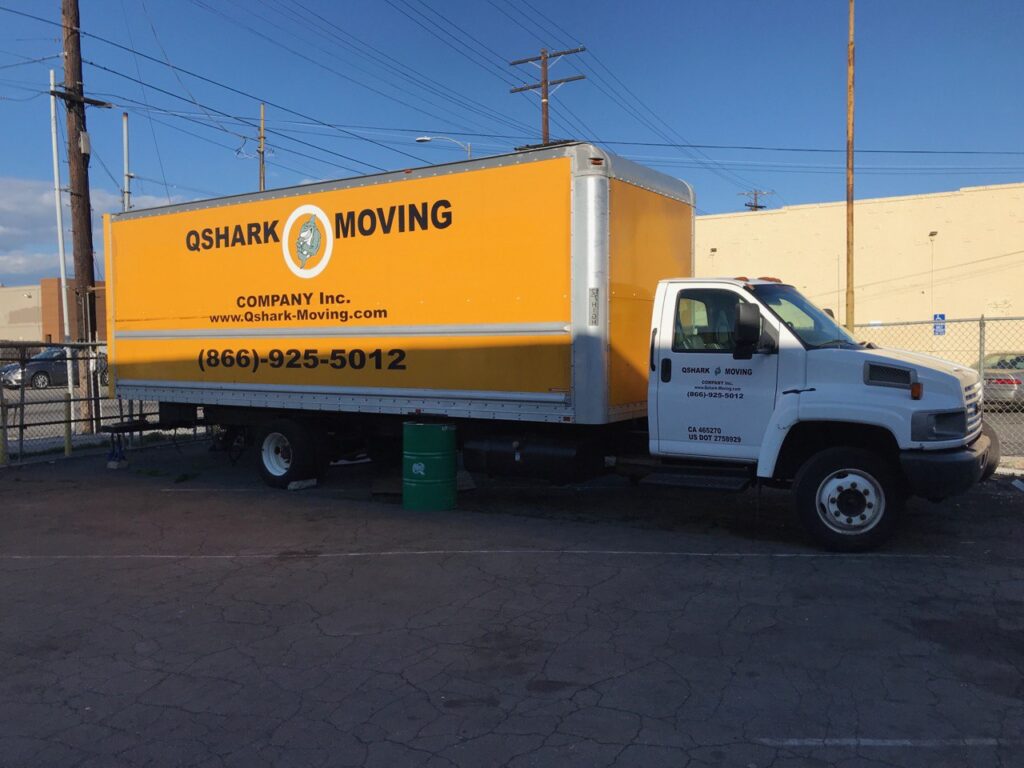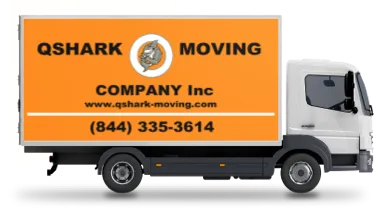
How to Find Cheap Movers?
Welcome to the QShark Moving Company’s in-depth guide on how to find affordable, reliable, and professional movers. Whether you’re on the lookout for top movers to facilitate your local or long-distance move, seeking best movers for your office relocation, or hunting for cheap movers for day labor, this guide will walk you through every step of the process. Below is how to find cheap movers.
Why Finding Affordable Movers Matters
When planning a move, cost is one of the most significant considerations. Balancing your budget while ensuring you receive a quality moving service is crucial. This guide will assist you in:
- Understanding the moving industry
- Planning your move
- Finding and evaluating moving companies
- Negotiating a great deal
What This Guide Covers
- Understanding the Moving Industry
- Defining What ‘Cheap’ Means
- Tips to Plan Your Move
- Ways to Find Cheap Movers
- Evaluating Moving Companies
- Getting a Moving Estimate
- Negotiating a Good Deal
- Reducing the Cost of Your Move
- After You Choose a Mover
- What Makes QShark Moving Company a Great Value Option
- Conclusion
- Frequently Asked Questions (FAQ)
“Planning a move doesn’t have to be stressful. With the right knowledge and preparation, it can be a smooth and seamless experience.” – QShark Moving Company
We at QShark understand that every move is unique, and finding Orange County Movers, Movers San Diego, or Irvine Movers that offer quality services at competitive rates can be a daunting task. Whether it’s local moving, office moving, piano moving, day labor, packing services, or long distance moving, we offer a variety of services to fit your moving needs. Let us guide you through this process, ensuring you receive the best value for your money while enjoying a hassle-free moving experience.
Continue reading to discover the crucial steps and tips for finding a reliable Moving Company that fits your budget.
Understanding the Moving Industry
As you embark on your quest to find the perfect moving company, it is essential to familiarize yourself with the moving industry. Understanding its dynamics and intricacies will equip you with the necessary knowledge to make informed decisions.
A Brief History of the Moving Industry
The moving industry has evolved significantly over the years. From horse-drawn wagons to modern, specialized trucks and vans, movers today have the tools and equipment to handle all types of moves efficiently and safely. Today, professional movers offer an array of services that extend beyond the simple transportation of goods.
Factors That Affect the Cost of Moving
Various elements influence the cost of your move:
- Distance of the move: Generally, long distance movers charge more than local movers due to the increased fuel costs, driving time, and additional logistics.
- The volume of items: The more items you have to move, the higher the cost. This is because a greater volume of items usually requires more manpower, larger vehicles, and more time.
- Type of items: Special items such as pianos, antiques, or valuable art pieces may need special handling or equipment and, therefore, may incur additional costs.
- Moving services: The type of service you choose also influences the cost. Comprehensive services like packing services, office moving, or day labor might cost more than a simple transport service.
- Time of the move: Your move can also impact the cost. Moving during peak season, on weekends, or end of the month usually costs more.
Common Pitfalls to Avoid When Looking for Cheap Movers
When searching for cheap movers, it’s easy to fall into certain traps. Here are some common pitfalls to avoid:
- Not researching the mover thoroughly: Check the mover’s licensing, insurance, reviews, and complaint history before you book.
- Ignoring the fine print: Always read your moving contract thoroughly to understand the terms and conditions and any extra charges that may apply.
- Choosing a mover based solely on price: The cheapest option is not always the best. Consider the quality of service and the company’s reputation as well.
This knowledge will help you navigate the moving industry more effectively. The next step is understanding what ‘cheap’ truly means in the context of moving.
Defining What ‘Cheap’ Means
In moving services, ‘cheap’ does not necessarily mean low-quality. A cheap move should be cost-effective and provide good value for your money.
The Difference Between Cheap and Value-for-Money
It’s crucial to differentiate between a cheap move and a value-for-money move:
- Cheap Move: A cheap move is primarily focused on low costs, often compromising on aspects like safety, reliability, and quality of service.
- Value-for-Money Move: A value-for-money move balances affordability with quality. While the cost may be relatively low, the emphasis is on providing reliable, efficient, and high-quality services.
Why the Cheapest Option Isn’t Always the Best
While choosing the moving company offering the lowest price can be tempting, remember that a successful move depends on more than just cost. It’s important to take into account the company’s reliability, professionalism, and range of services. The cheapest company might end up costing you more in the long run if they provide subpar service or damage your belongings.
The Importance of Value – Affordability and Quality
When searching for professional movers, the goal should be to find a company that provides great value – a balance of affordability and quality. This means choosing a moving company that offers reasonable prices without compromising service quality. QShark Moving Company, for instance, prides itself on delivering exceptional service at competitive rates.
With a clear understanding of what ‘cheap’ truly means, you can start planning your move strategically to get the best value.
Tips to Plan Your Move
Moving can be an overwhelming process, but it can be a seamless and even enjoyable experience with strategic planning and organization. Below, we’ll guide you on how to plan your move effectively.
The Benefits of Planning Ahead
When it comes to moving, the saying, “the early bird gets the worm,” holds. Starting your preparations early can save you a lot of stress and, potentially, money. Some benefits of planning ahead include:
- Better availability: By booking your movers in advance, you can secure your preferred moving date and avoid the rush of peak season.
- Time for research: Starting early gives you ample time to research and compare moving companies.
- Opportunity to declutter: An early start allows you more time to sort through your items and decide what to keep, donate, sell, or discard, potentially reducing moving costs.
Creating a Moving Checklist
A moving checklist is an excellent tool to keep your move organized and on track. Here are some tasks to include:
- Research and book a moving company.
- Sort, declutter, and organize your belongings.
- Arrange for packing supplies or book a packing service.
- Notify important parties (utilities, subscriptions, banks, etc.) about your move.
- Plan for the moving day (meals, child or pet care, etc.)
Determining Your Budget for the Move
One of the initial steps in planning a move is to define your budget. Consider all possible expenses, such as:
- Moving company charges
- Packing supplies or services
- Travel costs (fuel, accommodations, meals, etc., for long-distance moves)
- Potential storage costs
- Costs related to setting up your new home
Determining your budget will help guide your decisions and prevent unexpected costs.
By planning your move thoroughly and in advance, you’re setting yourself up for a successful, stress-free move. Next, let’s explore how to find cheap, reliable movers.

Ways to Find Cheap Movers
Finding cheap movers that provide quality service can seem like a daunting task. However, with the right strategies, you can identify movers that offer great value for your money.
Online Search and Reviews
Start your search online. Look for movers in your area and check out their websites to learn about their services and pricing. It’s also beneficial to read online reviews. Websites like Yelp, Google, and the Better Business Bureau can provide insight into the company’s reputation and customer satisfaction. Remember to take overly positive and negative reviews with a grain of salt and look for patterns in customer feedback.
Word-of-Mouth Recommendations
Recommendations from friends, family, or colleagues can be extremely valuable. If someone you trust had a good experience with a moving company, it’s worth considering. Ask about their experiences, cost, services, and whether they’d use the same company again.
Checking Local Directories
Local directories and Yellow Pages can be good resources for finding moving companies in your area. However, do not forget to do additional research on any company you find this way.
Contacting Real Estate Agents for Recommendations
Real estate agents have extensive experience with moving companies, as their clients frequently require these services. They can usually recommend reliable and affordable movers in your area.
By exploring multiple avenues, you’re more likely to find a moving company that fits your needs and budget. But finding potential movers is only half the battle. The next crucial step is evaluating these moving companies.
Evaluating Moving Companies
After you’ve compiled a list of potential movers, it’s time to evaluate them to ensure they meet your needs and standards. Here are some factors to consider:
Licensing and Insurance
First, ensure the moving company is properly licensed and insured. This is crucial for your protection in case something goes wrong during the move. The mover should have a Department of Transportation (DOT) number for interstate moves.
Experience
Look at how long the company has been in business. A moving company with many years of experience is likely to have a well-trained crew and a proven track record of success.
Services Offered
Consider the services the company offers. Do they provide additional services you may need, such as packing services, day labor, or office moving?
Reviews and Ratings
Check out the company’s reviews and ratings on sites like Google, Yelp, and the Better Business Bureau. Look for patterns in the reviews. For instance, if many reviews mention a punctual crew or excellent customer service, it’s a good sign.
Quotes and Estimates
Ask for moving estimates from each company. They should be willing to provide a detailed quote with all costs clearly outlined. Be wary of any company that provides an estimate without assessing your belongings either in person or virtually.
Company’s Policies and Procedures
Understand the company’s policies and procedures. This includes their process for handling complaints, claims for lost or damaged items, and cancellations or changes to the moving date.
Now that you know how to evaluate moving companies, you can start shortlisting your top choices. Remember, the cheapest option isn’t always the best. Prioritize value for money, rather than just the lowest price.
Getting a Moving Estimate
Once you’ve shortlisted a few promising moving companies, the next step is to get an estimate. An accurate moving estimate is a critical part of budgeting for your move.
Understanding Different Types of Estimates
Moving companies generally offer three types of estimates:
- Non-binding estimate: This is an estimate of what the move will cost, based on the mover’s survey of your items. The final cost may be higher or lower depending on the actual weight of your items and the services provided.
- Binding estimate: This is a fixed cost estimate. The mover guarantees this price for the move and the listed services, regardless of whether the actual weight is higher or lower.
- Binding not-to-exceed estimate: This is the best option for the customer. If the actual weight of your shipment is more than the written estimate, you still pay the amount quoted. However, if the weight is less than the estimated weight, you pay the lesser amount.
How to Get a Moving Estimate
To get a moving estimate:
- Contact the moving companies you’re considering and schedule an appointment for them to survey your items. This can often be done virtually.
- Be sure to show the estimator every item you plan on moving.
- Discuss additional services like packing, piano moving, or office moving to get an accurate estimate.
- Get the estimate in writing, clearly stating the type of estimate and the services included.
An accurate moving estimate will help you budget for your move and enable you to effectively compare costs between different moving companies.
Finalizing Your Choice of Mover
After gathering estimates, it’s time to finalize your choice. Comparing different movers can seem complicated, but focusing on a few key factors can make the decision easier.
Comparing Estimates
When comparing estimates, make sure you’re comparing apples to apples. Check that each estimate includes the same list of services. A lower estimate might exclude essential services, making it appear cheaper. Make sure to understand any extra costs and when they apply.
Evaluating Services
Go beyond the price and evaluate the quality and range of services offered. Are services like packing and day labor included? Does the company offer specialized services like piano moving if you need them?
Revisiting Reviews and Ratings
Revisit the company’s reviews and ratings one more time before making your final decision. A slightly more expensive mover with stellar reviews may offer better value for money than a cheaper mover with poor reviews.
Trusting Your Gut
Sometimes, it comes down to your gut feeling. If a company ticks all the boxes, but something doesn’t feel right, choosing another company is perfectly acceptable. After all, these people will be handling your personal belongings.
Once you’ve chosen your mover, you can relax knowing you’ve done your due diligence to find a reliable, affordable mover. By planning ahead, doing your research, and comparing your options, you’ve set the stage for a successful, stress-free move.
Congratulations, you’ve completed the first major task on your moving checklist! Now, it’s time to start preparing for moving day.
Preparing for Moving Day
Now that you’ve booked your professional movers, it’s time to prepare for the big day. A well-prepared move will ensure everything runs smoothly, reducing stress on moving days.
Declutter and Downsize
Before you start packing, take the time to declutter and downsize:
- Go through your belongings and decide what to keep, sell, donate, or throw away.
- Selling or donating items you no longer need can reduce the amount of stuff you have to move, potentially lowering your costs.
Start Packing Early
Don’t underestimate the amount of time it takes to pack up a home. Start packing early to avoid a last-minute rush:
- Begin with items you don’t use daily, such as seasonal clothing, books, and decorations.
- Make sure to label each box clearly with its contents and the room it belongs to.
- Consider hiring professional packing services if you’re short on time or overwhelmed with the task.
Prepare an Essentials Box
Pack an ‘essentials’ box with everything you’ll need in your new home for the first day or two. This might include toiletries, a change of clothes, essential kitchen items, medication, and important documents.
Notify Important Parties
Notify important parties about your move:
- Update your address with the post office, banks, insurance providers, and any subscription services.
- Notify utility companies at your old and new addresses to arrange service disconnect/connection.
Prepare Your Home
Prepare your home for moving day:
- Dismantle furniture if necessary, and ensure all appliances are empty and clean.
- Clear a path in your home for easy movement of boxes and furniture.
- If you’re moving out of an apartment, reserve the elevator and make sure there’s a place for the moving truck to park.
By preparing for moving day, you’ll ensure a smoother, less stressful move. Now, you’re ready for your cheap, efficient move with your chosen company.

Moving Day Etiquette
As moving day approaches, it’s essential to consider the etiquette involved in interacting with your moving service. A few simple courtesies can go a long way in ensuring a positive moving experience.
Be Ready Before the Movers Arrive
Ensure everything is packed, labeled, and ready to go when the movers arrive. The quicker they can get started, the quicker you’ll be settled into your new home.
Clear a Path
Make sure there’s a clear path for the movers to move your belongings from your home to the moving truck. This involves removing potential obstacles, like loose rugs, toys, or other clutter.
Provide Refreshments
While not required, providing refreshments like water, coffee, or light snacks is a considerate gesture appreciated by many movers. If it’s a hot day, cold drinks can be a lifesaver.
Tip Appropriately
Tipping is a standard way to show appreciation for a well-done job. While the amount can vary, a general guideline is to tip each mover $4-5 per hour. You might consider tipping more for exceptional service or a particularly large or difficult move.
Practicing good moving day etiquette can help ensure a smoother, more pleasant moving experience for everyone involved.
In the next section, we’ll look at settling into your new home.
Settling into Your New Home
After the movers have left, the final step in your moving journey is to settle into your new home. You might consider doing some things to make this process as smooth as possible.
Unpack Systematically
Start by unpacking your essentials box and setting up your bed if it hasn’t been done already. Having a place to sleep and basic items readily available will make the first night in your new home more comfortable. Then, systematically unpack the rest of your belongings, focusing on one room at a time.
Set Up Utilities and Services
If you haven’t done so already, set up all necessary utilities and services such as water, electricity, gas, internet, and cable.
Explore Your New Neighborhood
Take some time to explore your new neighborhood. Find out where the nearest grocery store, pharmacy, bank, and other essential services are located. If you have kids, look into local parks and recreational facilities.
Update Your Address
Don’t forget to update your new address with any remaining organizations or individuals who may need it. This could include your employer, your children’s schools, and online shopping websites.
Meet Your Neighbors
Introducing yourself to your neighbors can make you feel more at home. They can provide valuable information about the local community, services, and amenities.
Settling into a new home takes time, so be patient with yourself. With your careful planning and the help of QShark Moving Company, your move should be as smooth and stress-free as possible.
Congratulations on your new home!


